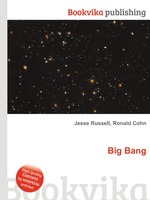Big Bang
Jesse Russell Ronald Cohn
бумажная книга
High Quality Content by WIKIPEDIA articles! The Big Bang theory is the prevailing cosmological model that explains the early development of the Universe. According to the Big Bang theory, the Universe was once in an extremely hot and dense state which expanded rapidly. This rapid expansion caused the young Universe to cool and resulted in its present continuously expanding state. According to the most recent measurements and observations, this original state existed approximately 13.7 billion years ago, which is considered the age of the Universe and the time the Big Bang occurred. After its initial expansion from a singularity, the Universe cooled sufficiently to allow energy to be converted into various subatomic particles. It would take thousands of years for some of these particles (protons, neutrons, and electrons) to combine and form atoms, the building blocks of matter. The first element produced was hydrogen, along with traces of helium and lithium. Eventually, clouds of hydrogen would coalesce through gravity to form stars, and the heavier elements would be synthesized either within stars or during supernovae.


